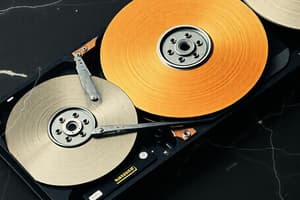Podcast
Questions and Answers
What is the primary function of a hard disk drive?
What is the primary function of a hard disk drive?
- To provide power to the computer system
- To connect peripherals to the computer system
- To manage the operation of the entire computer system
- To provide mass storage for data and programs (correct)
What is the material used to coat the platter in a hard disk drive?
What is the material used to coat the platter in a hard disk drive?
- Silver
- Gold
- Copper
- A thin layer of magnetic material (correct)
What determines the performance of a hard disk drive?
What determines the performance of a hard disk drive?
- The number of read/write heads
- The capacity of the hard disk drive
- The speed of the actuator and the read/write head (correct)
- The type of material used to make the platter
What is the typical rotational speed of modern hard disk drives?
What is the typical rotational speed of modern hard disk drives?
What is the component of a hard disk drive that manages the operation of the entire drive?
What is the component of a hard disk drive that manages the operation of the entire drive?
What has increased significantly over the years in hard disk drives?
What has increased significantly over the years in hard disk drives?
What is the primary reason for the significant increase in storage capacity of hard disk drives?
What is the primary reason for the significant increase in storage capacity of hard disk drives?
What is a major advantage of hard disk drives over other storage technologies?
What is a major advantage of hard disk drives over other storage technologies?
What is a disadvantage of hard disk drives compared to solid-state drives?
What is a disadvantage of hard disk drives compared to solid-state drives?
What is a characteristic of optical disk drives, such as CDs and DVDs?
What is a characteristic of optical disk drives, such as CDs and DVDs?
What is the main advantage of solid-state drives over hard disk drives?
What is the main advantage of solid-state drives over hard disk drives?
What is the role of hard disk drives in a computer system?
What is the role of hard disk drives in a computer system?
Flashcards are hidden until you start studying
Study Notes
Hard Disk Drives
Hard disk drives (HDDs) are an essential component of a computer system, providing mass storage for data and programs. They have been the primary storage choice for decades, offering high storage capacity and a relatively low cost per byte. HDDs are part of the disk architecture, which includes both hard disk drives and optical disk drives.
Architecture of Hard Disk Drives
Hard disk drives consist of several components, including the platter, actuator, read/write head, and controller. The platter is a circular disk made of aluminum or glass coated with a thin layer of magnetic material. The actuator is a motor that moves the read/write head across the surface of the platter to read and write data. The read/write head is a small electromagnetic device that reads and writes data by magnetizing the magnetic material on the platter. The controller is a microprocessor that manages the operation of the entire drive.
Performance and Capacity of Hard Disk Drives
The performance of hard disk drives is determined by several factors, including the speed of the actuator, the speed of the read/write head, and the number of platters in the drive. Modern hard disk drives typically have a rotational speed of 5,400 or 7,200 revolutions per minute (RPM). Some high-performance drives have a rotational speed of 10,000 RPM or even 15,000 RPM, which results in faster access times for data.
The capacity of hard disk drives has increased significantly over the years. Early hard disk drives had a capacity of only a few megabytes, while modern drives offer terabytes of storage. This increase in capacity is due to advances in disk technology and the use of multiple platters in a single drive.
Advantages and Disadvantages of Hard Disk Drives
Hard disk drives have several advantages over other storage technologies. They offer a large storage capacity at a relatively low cost per byte. They also have a high data transfer rate, which makes them well-suited for tasks such as video editing and gaming.
However, hard disk drives also have some disadvantages. They are susceptible to physical damage, such as scratching or bending, which can cause data loss. They are also more prone to failure compared to newer storage technologies, such as solid-state drives (SSDs).
Comparison with Other Storage Technologies
Compared to other storage technologies, hard disk drives offer a good balance between cost, capacity, and performance. Solid-state drives (SSDs) offer faster access times and are more durable, but they are more expensive and have a lower storage capacity per dollar. Optical disk drives, such as CDs and DVDs, offer a low cost per byte but have a lower data transfer rate and a limited storage capacity.
In conclusion, hard disk drives are an important part of the disk architecture of a computer system. They offer a large storage capacity at a relatively low cost and have a good balance between performance and cost. While they have some disadvantages compared to newer storage technologies, they remain a popular choice for mass storage in computers.
Studying That Suits You
Use AI to generate personalized quizzes and flashcards to suit your learning preferences.




